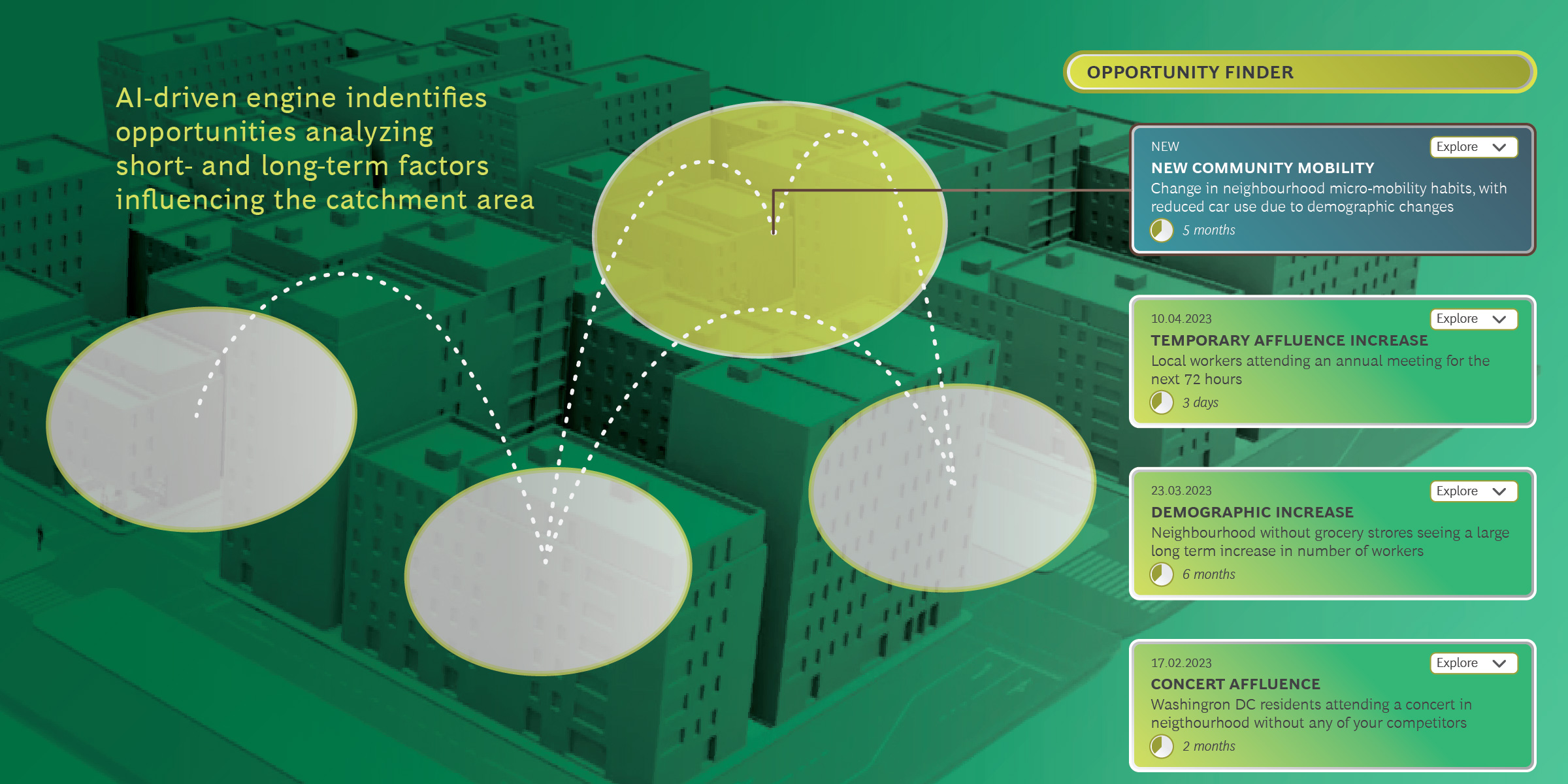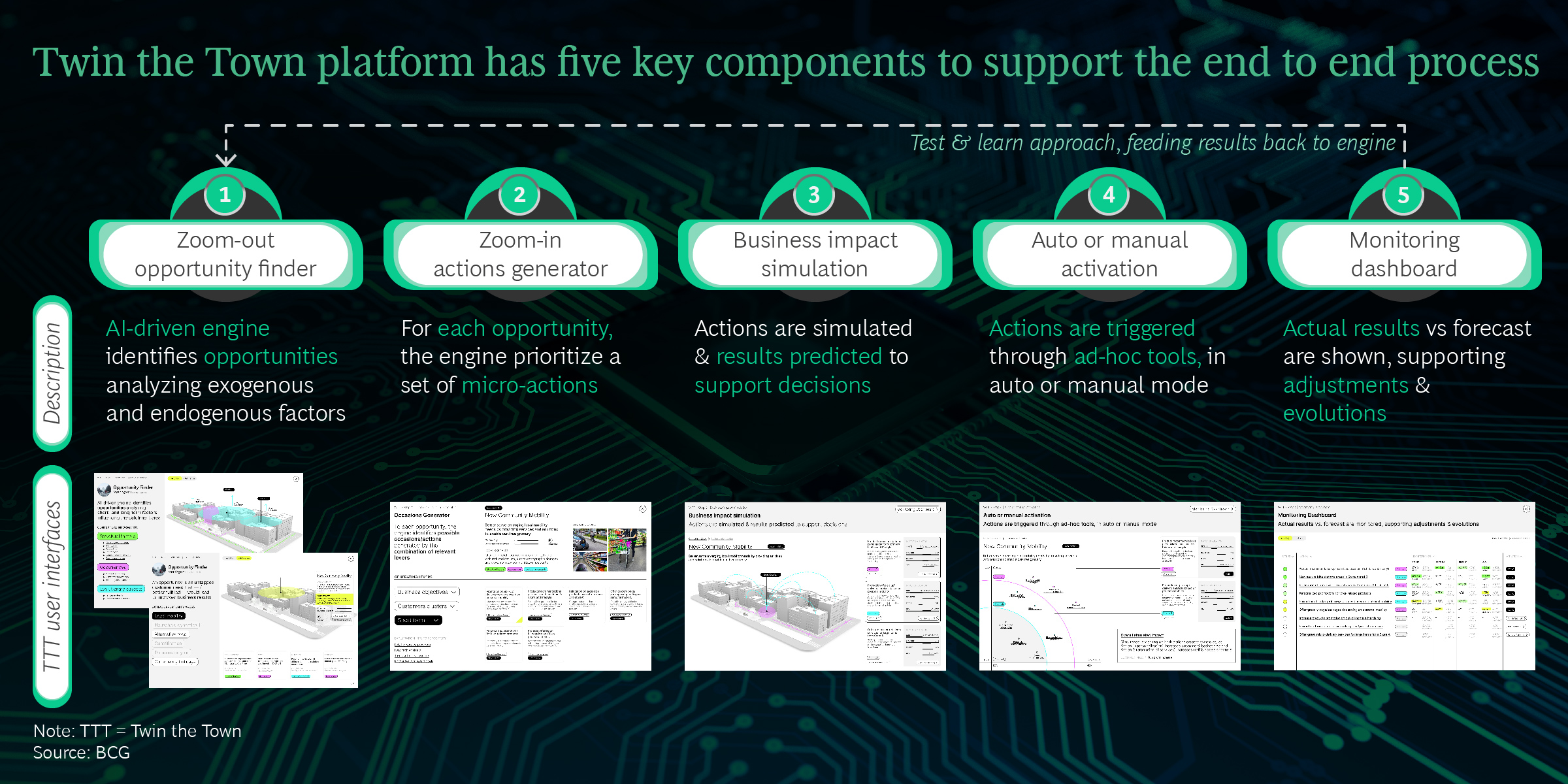Retailers are expressing urgent interest in AI-enhanced, hyper-local approaches to discovering, assessing, and maximizing previously untapped sales opportunities. The rush to a meaningful use of AI, integrated into a micro-contextual analytics system, is very real: we estimate retailers could miss out on a possible 2-4% revenue uplift if they fail to act.
In this article we take a look at the background to these important shifts, the consumer trends driving them, and the unique way BCG works to partner with dynamic retailers to build a bespoke platform.
Background: trends, threats and opportunities
The fundamental landscape of retail is undergoing several major shifts, and for this reason Boston Consulting Group (BCG) has identified trends that every retailer must address to stay competitive as they work to exploit AI’s advantages.
The first of these trends is a long-term change: modern consumers no longer seek just products, but holistic solutions. As customer expectations continue to evolve, consumers now demand superior service offerings across the board. The second is the irreversible shift to online channels, making it crucial for retailers to seamlessly blend on- and offline channels to deliver end-to-end experiences. Finally, advancements in data and technology, particularly AI, are reshaping the retail value chain. The rise of GenAI will accelerate effectiveness of personalized customer targeting, while automation has led to increases in operational efficiency for scale players.
These trends also mean there is a pressing need for retailers to get smarter in how they serve their specific catchment areas. The pivot towards holistic solutions, the imperative of multi-channel integration, and the transformative power of data and AI point to the same conclusion: a one-size-fits-all strategy is a relic of the past. To succeed in today’s competitive landscape, retailers must employ a more nuanced and localized approach that leverages advanced technologies and data analytics. This will enable them to better understand the unique needs, behaviors, and contexts of their local customer base, ultimately building stronger, more meaningful relationships with consumers.
What’s more, we estimate modern retailers may be missing out on a 2-4% revenue uplift that they’re failing to capture.
Shaping the consumer’s entire retail experience is key — and we believe modern retailers need to harness the strengths of AI insights to make the most of it. Only when retailers activate micro-actions, driven by AI engines, can they accurately identify opportunities based on short and long-term factors within a catchment area.
To do this, retailers need to transform the essential building blocks of their business — and that’s where our Twin the Town or TTT platform, is already helping to initiate the next generation of retail platforms.
‘Twin’ the Town — to Win the Town
Within the BCG ‘Win the Town’ narrative, the TTT platform is best described as a ‘Digital Twin Town.’ Inputs to the system include external data, plus information on social events, footfall, spending, demographics, weather and material conditions, details of competitors, and more. Once the system has built a ‘digital twin’ of the ‘town’ or physical retail environment, the platform identifies local business opportunities and suggests appropriate actions for the retailer. Based on a given opportunity, the engine identifies numerous micro-occasions and tailored short-term actions (promotion, pricing, etc) that can be executed towards individual consumers at the hyper-local level. So, the system proactively helps retailers discover, activate and monitor contextualized opportunities that are currently untapped within certain catchment areas, to increase sales and margins.

The TTT platform dashboard in operation, showing opportunities identified for exploration
The meticulous integration of different online and offline formats ensures an uninterrupted and consistent client experience across all touchpoints. The result not only boosts customer satisfaction, but also enhances operational efficiency.
It’s a bold response to the fact that retailers today must compete for customers at the local level with an approach that emphasizes customer density. The TTT platform was developed by a multidisciplinary BCG team, including engineers, Retail experts, CX designers, IT architects and data scientists, then reviewed, assessed and co-tested with senior clients to check against, and align with, their needs.
Developing this deep understanding of consumer needs through micro contextualization means we are able to enhance satisfaction and conversion rates — and therefore margins and returns. Automated AI tools predict the potential business impact of individual actions, and TTT platform then brings these together to simulate cross-effects. Business impact simulation means that actions in response to these changing micro-actions and factors can be simulated and the results predicted — supporting decisions before they’re even taken.
With this integrated local view, retailers can form a coherent view of a consumer’s entire retail experience, and act accordingly — fast, with actions that can be triggered automatically or manually, through dedicated BCG tools.

The TTT Platform tool set is based on a test and learn approach, starting from a Zoom-out opportunity finder and leading to a dashboard for monitoring actual results
In addition to offering a comprehensive product vision and a fully functioning software prototype, we provide a suite of tools designed to seamlessly integrate TTT with client operations. The tools include:
- Zoom-out Opportunity Finder: Utilizing AI, this engine analyzes both external and internal factors to identify growth opportunities.
- Zoom-in Actions Generator: For each identified opportunity, the engine recommends specific micro-actions to capitalize on them.
- Business Impact Simulation: The recommended actions undergo a simulation to predict potential outcomes, aiding decision-making processes.
- Auto or Manual Activation: These actions can be implemented either automatically or manually through specialized tools.
- Monitoring Dashboard: Allows users to compare actual results against forecasts, enabling real-time adjustments and long-term strategy evolutions.
A key value of the TTT Platform is the AI-powered suggestion of valuable actions for insight-driven operational and commercial activities (e.g., suggest a tailored communication to send to a targeted cluster, identifying the most valuable time and place to act). The seamless integration of the TTT Platform with the BCG Retail AI Moonshot AI-driven products boosts the positive impact of the commercial action (e.g. building and engaging a loyal customer base through hyper-personalized content and messaging, Defining the optimal tailored strategy for pricing & promotion and marketing for customers etc).
Potential use cases for the TTT platform suite of tools are diverse and strategically relevant. They include examples such as:
-
- Need for in-store pickup of specific products: We can gather an increased interest in pet well-being based on social network trends, identify the specific target, and send out a notification about specific pet-related promotions. In the meantime, we predict severe stock-out risk due to the promotion and send an automatic e-mail to distributors on defined stock levels to prevent the stockout and related extra costs.
-
- Social and geo-localized data triggering promo/price actions: Identify higher probability drivers’ stop – given the traffic forecast day – and notify an opportunity. Traffic is supposed to increase after 11:00, so you set up lunch special offers as well as geotargeted promotions to drivers and increase “fresh meal preparation” for better customer satisfaction. The promotion is running successfully, and you achieve a 15% daily revenue uplift from this initiative.
-
- Store Planning for New Openings: Analyze the changing lifestyles and needs of various households to pinpoint the most advantageous locations for new store openings. For instance, if there’s a growing demand for specific products in an underserved area, our tools can identify this opportunity.
-
- Adoption of Alternative Products: We can identify early adopters within the community who are inclined to try new, alternative products. This is particularly useful for businesses looking to meet new criteria or emerging consumer preferences for specific product categories.
- Local Customization for Furniture Recycling: Capture customer expectations regarding sustainability and tap into local dynamics to offer solutions. For example, recognizing the demand for services that support a product throughout its entire life cycle can be invaluable for planning recycling or refurbishing initiatives.

Case study
The manager of a furniture store uses TTT analysis, based on social media posts, to predict an increase in smart working locally. This will create stronger interest in work from home equipment among his target customers, and so the system also helps him add a seasonal impact element, focusing on terrace and garden items. He builds tailored offers to catch this opportunity.
-
- Captures the evolution of household lifestyles
-
- Matches customer density with local trends and user clusters
- Stock optimization is enhanced; higher conversion rate in-store
Co-created for maximum accuracy and efficiency
The TTT system combines the best opportunities that AI has to offer in retail with a collaborative approach from BCG that understands and builds on what makes your sales strategy unique. The platform weaves together the key threads of modern commerce, resulting in a composite picture of efficiency, engagement, and strategic advantage.
Clients who co-create a TTT solution with BCG are set to reap significant advantages, positioning themselves as pioneers in the rapidly growing field of hyper-localization AI. And collaboration with BCG also brings financial advantages, as clients can benefit from a preferential partnership rate.
In conclusion, it’s becoming increasingly clear that the consumer’s retail experience can be significantly enhanced through the judicious use of AI insights, tailored within a custom platform. By initiating AI-driven micro-actions, retailers can adeptly pinpoint opportunities, both immediate and future-oriented, within their target demographic areas. As we look to the future of retail, harnessing the power of AI to shape and maximize the complete consumer journey is set to be a defining success factor.
Contact us for more details, a demo, or simply a chat.
About the Authors
Ivano is a Managing Director & Partner at BCG Platinion based in Milan. He has a long history of success in supporting consumer companies in unlocking strategic tech & digital transformations across the retail, CPG, fashion and luxury, and travel and tourism sectors. His 25+ years of experience spans from strategic advisory to value realization, defining a vision of leadership enabled by technology, including designing target technology architecture, platforms, and roadmaps. He is steering large-scale tech & digital implementation programs to deliver business impact
Antonino Campione
Associate DirectorMilan, Italy
Antonino Campione is a Associate Director in the Milan office of BCG Platinion. He is specialized in several Technology & Digital core topics and is member of the Leadership Group of BCG Platinion Consumer and Retail Practice Area (CPA).
Giacomo Capelli is a Principal in the Milan office of BCG Platinion. He first joined the firm in 2018 after 1 year as a Data Scientist at PwC. He then spent two years at BCG Platinion before leaving to serve as Head of Tech & Chief of Staff for an Italian food retail startup. He re-joined BCG Platinion as a Manager in September 2021.
Alberto joined BCG in 2021 as a Consultant in the Milan office. Prior to BCG, he had 7+ years of Consulting and Industry experience, with a focus on Innovation and Digital Transformation Strategy.


